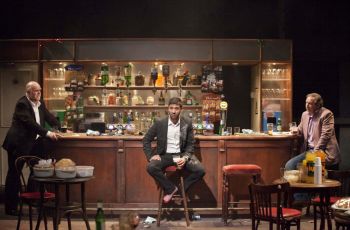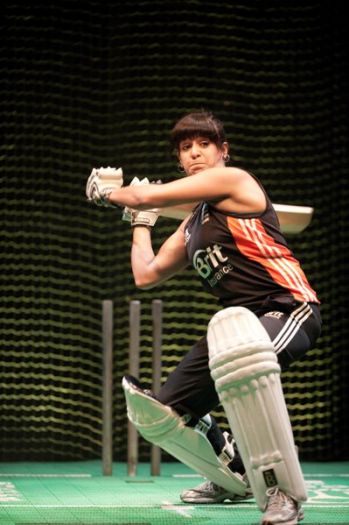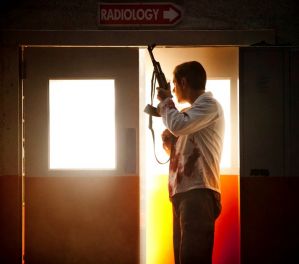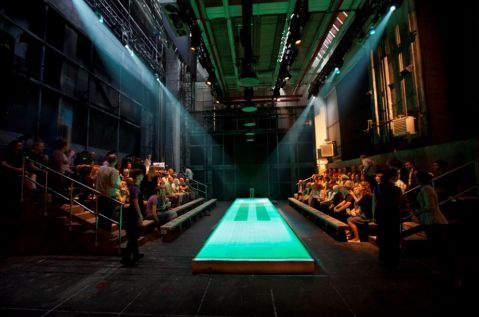Double Feature: Edgar & Annabel/The Swan, Nightwatchman/There is a War, National Theatre | reviews, news & interviews
Double Feature: Edgar & Annabel/The Swan, Nightwatchman/There is a War, National Theatre
Double Feature: Edgar & Annabel/The Swan, Nightwatchman/There is a War, National Theatre
Hits and misses in the Paintframe, a found space for new writing
It’s not much of an exaggeration to suggest that new plays by up-and-coming talents are something of an Achilles heel at the National Theatre. Even Mike Bartlett’s much lauded Earthquakes in London was a far more exciting production than it was a play, while Greenland proved so devoid of audience that it was pulled early from the schedule. The latter did no favours to anyone by yoking together four dramatists including the impressive Penelope Skinner. Now four more emerging playwrights have been given their head but this time their voices remain distinct in the two double bills that comprise Double Feature.
The last thing you’d expect twentysomething writers to be examining is duty but, in one form or another, that seriously unfashionable notion turns out to be present in all four plays. Powering her way through the absurdist minefield of the Alice-in-Wonderland-with-weapons world that is Tom Basden’s There is a War, Phoebe Fox’s increasingly fierce and frustrated doctor clings to her need to help the wounded. Family duties and expectations are blown apart, this time by gunfire dialogue, in the pre-wake pub gathering of DC Moore’s The Swan. In Prasanna Puwanarajah’s monologue Nightwatchman, Stephanie Street is the self-styled “Only Brown Girl in Salford Who Plays Cricket” hitting out literally and metaphorically against her expected role as a dutiful daughter of a Sri Lankan family.
The most complex duties, however, are those on seriously impressive display in Edgar & Annabel. Marianne (deliciously over-bright Kirsty Bushell) is in her neat, anodyne kitchen with her partner Nick (Trystan Gravelle) preparing dinner à deux but it’s obvious from the start that there’s something intriguingly off-key, not least the fact that they’re glued to scripts that Nick has produced from his bag. No, this is not some tiresome postmodern “look, we’re acting” exercise. Marianne and Nick are freedom fighters in a house that’s wired for sound by unseen authorities. And because Big Brother is listening rather than watching, he’s unaware that on evenings when their fellow rebels Tara and Marc pop round for deliciously cringeworthy karaoke – Starship’s “Nothing's Gonna Stop us Now”, anyone? – they’re actually silently making bombs: Now That’s What I Call Subtext.
Sam Holcroft is hardly the first writer to set up a dystopian vision of individuals fighting with a party against an unseen political threat, but her wit is distinctive and hugely engaging. She spins laughs out of the increasingly disturbing dislocation between what the couple should be doing and what they are actually up to. Beneath the humour, the emotional undertow of Lyndsey Turner’s precisely played production grows increasingly strong and sad. She’s alive to Holcroft’s rich characterisation as Marianne and Nick struggle with their assigned roles and duties with emotional complications threatening to wreck everything.
 Escalating tension is, however, in relatively short supply elsewhere, notably in The Swan, the latest addition to the Funeral Bak'd Meats school of writing (former graduates include Graham Swift’s Last Rites, Shelagh Stephenson’s The Memory of Water) in which family secrets spill out at a wake in a dingy pub (pictured right) - a perfectly dowdy, totally convincing naturalistic design by Soutra Gimour. DC Moore has already netted a TMA award as well as nominations for an Olivier and the Evening Standard's Most Promising Playwright. His abrupt dialogue is impressively terse – has anyone used the word "cunted" before? – but beneath the dialogue there’s less subtext, more withheld information (which is considerably less satisfying) in order to set up revelations.
Escalating tension is, however, in relatively short supply elsewhere, notably in The Swan, the latest addition to the Funeral Bak'd Meats school of writing (former graduates include Graham Swift’s Last Rites, Shelagh Stephenson’s The Memory of Water) in which family secrets spill out at a wake in a dingy pub (pictured right) - a perfectly dowdy, totally convincing naturalistic design by Soutra Gimour. DC Moore has already netted a TMA award as well as nominations for an Olivier and the Evening Standard's Most Promising Playwright. His abrupt dialogue is impressively terse – has anyone used the word "cunted" before? – but beneath the dialogue there’s less subtext, more withheld information (which is considerably less satisfying) in order to set up revelations.
Polly Findlay’s production is filled with impressive work – Clare-Louise Cordwell is memorably mouthy as hard-as-nails Amy, girlfriend to Nitin Kundra’s amusing loser Bradwell. But cumulatively, they come across as “performances” because the writing encourages more display than listening. Long before the running time is out, the idea that their furiously expressed denial is not speaking to their hidden pain has been overstated. The calmest performance, from the beautifully assured Pippa Bennett-Warner, is the most eloquent.
 By contrast, the sharply alert Stephanie Street goes increasingly for the emotional jugular in Findlay’s marvellously crisp production of Nightwatchman. Street spends the play hitting unseen balls which we “see” thanks to the thwack and smash of Carolyn Downing’s seriously evocative (and funny) sound design. Street’s character may be about to play for England’s women’s team at Lords but Nightwatchman is really as much concerned with cricket as Mike Atherton is with flower-arranging. Prasanna Puwanarajah is much more interested in working through second-generation concerns about individual cultural identity in Britain and political responsibilities towards a homeland removed by a generation. Not unlike Beckett’s taut Play in which a light controls three speakers, the character’s outpouring is animated and controlled by the unseen bowling machine. Neat as that is, it never fully answers the question dogging all stage monologues: why exactly is the character speaking?
By contrast, the sharply alert Stephanie Street goes increasingly for the emotional jugular in Findlay’s marvellously crisp production of Nightwatchman. Street spends the play hitting unseen balls which we “see” thanks to the thwack and smash of Carolyn Downing’s seriously evocative (and funny) sound design. Street’s character may be about to play for England’s women’s team at Lords but Nightwatchman is really as much concerned with cricket as Mike Atherton is with flower-arranging. Prasanna Puwanarajah is much more interested in working through second-generation concerns about individual cultural identity in Britain and political responsibilities towards a homeland removed by a generation. Not unlike Beckett’s taut Play in which a light controls three speakers, the character’s outpouring is animated and controlled by the unseen bowling machine. Neat as that is, it never fully answers the question dogging all stage monologues: why exactly is the character speaking?
 Explanations for action are peppered throughout Tom Basden’s surreal There is a War, some of them funny, almost all of them self-serving. Everyone that the doctor, Ann, meets on her journey to a hospital is justifying their role in a war between The Blues and The Grays. In a succession of sketch-like scenes – think Brecht rewritten by Spike Milligan – we meet everyone from a dance teacher to an enraged chaplain in search of his church, a clown, a photographer, campaigners, soldiers, prisoners… That we never learn what anyone is actually fighting for is Basden’s point: he’s painting a serio-comic portrait of a society driven to murderous futility. The problem is, like Candide, the central character endlessly learns the same lesson. For all the inventiveness of Basden's mordant characterisation and Lyndsey Turner’s bravura staging, having the same point redelivered means hitting the law of diminishing returns.
Explanations for action are peppered throughout Tom Basden’s surreal There is a War, some of them funny, almost all of them self-serving. Everyone that the doctor, Ann, meets on her journey to a hospital is justifying their role in a war between The Blues and The Grays. In a succession of sketch-like scenes – think Brecht rewritten by Spike Milligan – we meet everyone from a dance teacher to an enraged chaplain in search of his church, a clown, a photographer, campaigners, soldiers, prisoners… That we never learn what anyone is actually fighting for is Basden’s point: he’s painting a serio-comic portrait of a society driven to murderous futility. The problem is, like Candide, the central character endlessly learns the same lesson. For all the inventiveness of Basden's mordant characterisation and Lyndsey Turner’s bravura staging, having the same point redelivered means hitting the law of diminishing returns.

The star of both evenings is Soutra Gilmour. The National’s need to keep London Road in the rep (the serious exception to new-writing weakness) meant the previously scheduled Cottesloe was unavailable so the productions were moved next door to the Paintframe (pictured above). Gilmour’s separate designs for each show completely reconfigure the space in arrestingly contrasted ways. The ability to pack her sure-footed work with perfectly controlled surprises is something most of the writers currently lack. Together with lighting designer James Farncombe, she and the directors have turned new writing, especially that of Sam Holcroft, into event theatre.
- Double Feature 1: Edgar & Annabel/The Swan and Double Feature 2: Nightwatchman/There is a War at the National Theatre, London until 10 September
Explore topics
Share this article
more Theatre
 An Actor Convalescing in Devon, Hampstead Theatre review - old school actor tells old school stories
Fact emerges skilfully repackaged as fiction in an affecting solo show by Richard Nelson
An Actor Convalescing in Devon, Hampstead Theatre review - old school actor tells old school stories
Fact emerges skilfully repackaged as fiction in an affecting solo show by Richard Nelson
 The Comeuppance, Almeida Theatre review - remembering high-school high jinks
Latest from American penman Branden Jacobs-Jenkins is less than the sum of its parts
The Comeuppance, Almeida Theatre review - remembering high-school high jinks
Latest from American penman Branden Jacobs-Jenkins is less than the sum of its parts
 Richard, My Richard, Theatre Royal Bury St Edmund's review - too much history, not enough drama
Philippa Gregory’s first play tries to exonerate Richard III, with mixed results
Richard, My Richard, Theatre Royal Bury St Edmund's review - too much history, not enough drama
Philippa Gregory’s first play tries to exonerate Richard III, with mixed results
 Player Kings, Noel Coward Theatre review - inventive showcase for a peerless theatrical knight
Ian McKellen's Falstaff thrives in Robert Icke's entertaining remix of the Henry IV plays
Player Kings, Noel Coward Theatre review - inventive showcase for a peerless theatrical knight
Ian McKellen's Falstaff thrives in Robert Icke's entertaining remix of the Henry IV plays
 Cassie and the Lights, Southwark Playhouse review - powerful, affecting, beautifully acted tale of three sisters in care
Heart-rending chronicle of difficult, damaged lives that refuses to provide glib answers
Cassie and the Lights, Southwark Playhouse review - powerful, affecting, beautifully acted tale of three sisters in care
Heart-rending chronicle of difficult, damaged lives that refuses to provide glib answers
 Gunter, Royal Court review - jolly tale of witchcraft and misogyny
A five-women team spell out a feminist message with humour and strong singing
Gunter, Royal Court review - jolly tale of witchcraft and misogyny
A five-women team spell out a feminist message with humour and strong singing
 First Person: actor Paul Jesson on survival, strength, and the healing potential of art
Olivier Award-winner explains how Richard Nelson came to write a solo play for him
First Person: actor Paul Jesson on survival, strength, and the healing potential of art
Olivier Award-winner explains how Richard Nelson came to write a solo play for him
 Underdog: the Other, Other Brontë, National Theatre review - enjoyably comic if caricatured sibling rivalry
Gemma Whelan discovers a mean streak under Charlotte's respectable bonnet
Underdog: the Other, Other Brontë, National Theatre review - enjoyably comic if caricatured sibling rivalry
Gemma Whelan discovers a mean streak under Charlotte's respectable bonnet
 Long Day's Journey Into Night, Wyndham's Theatre review - O'Neill masterwork is once again driven by its Mary
Patricia Clarkson powers the latest iteration of this great, grievous American drama
Long Day's Journey Into Night, Wyndham's Theatre review - O'Neill masterwork is once again driven by its Mary
Patricia Clarkson powers the latest iteration of this great, grievous American drama
 Opening Night, Gielgud Theatre review - brave, yes, but also misguided and bizarre
Sheridan Smith gives it her all against near-impossible odds
Opening Night, Gielgud Theatre review - brave, yes, but also misguided and bizarre
Sheridan Smith gives it her all against near-impossible odds
 The Divine Mrs S, Hampstead Theatre review - Rachael Stirling shines in hit-and-miss comedy
Awkward mix of knockabout laughs, heartfelt tribute and feminist messaging never quite settles
The Divine Mrs S, Hampstead Theatre review - Rachael Stirling shines in hit-and-miss comedy
Awkward mix of knockabout laughs, heartfelt tribute and feminist messaging never quite settles
 Power of Sail, Menier Chocolate Factory review - alternately stiff and startling
Paul Grellong play delivers in its final passages
Power of Sail, Menier Chocolate Factory review - alternately stiff and startling
Paul Grellong play delivers in its final passages

Add comment